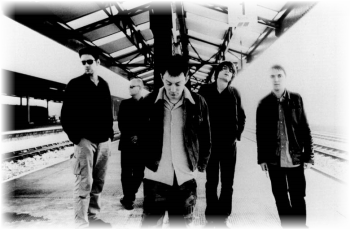Your shopping cart is empty!
602-904-5554 | Email Us | Shopping Cart

A good band photo can make the difference when it comes to getting your band featured in a magazine. It may seem pretty simple to whip out your phone, click a couple of shots and send them off, but getting your best band photos should involve more than that ... a lot more.
Here are some tips and tricks to consider when taking band photos, plus some advice for the budding band photographer in you.
The Best Band Photos Start Here
When considering how to get your band photos done, you should keep these five points in mind:
Read more: How to Take Photos of Your Band That Look Professional

Promotional photos serve many purposes for music journalists beyond just being something to feast our eyes upon. They introduce us to the people behind the music and help create or reinforce a narrative of a band, which can aid us in our writing process. They grab readers' attention and can make more people inclined to check out a story. They sometimes even make our articles easier to read by breaking up otherwise dense chunks of text. We love promo photos and who can blame us?
One thing most people don't know is that from where we're sitting, the functionality of a promo photo is often as important as any other element. In our deadline-centric worlds, we need to round up artwork fast, and those images often have to meet exacting standards of size or style (for example, some magazines won't run live shots outside of concert reviews). With all of that in mind, here are five elements essential to music journalists when it comes to promo photos.
Read more: 5 Ways to Impress Music Journalists With Your Promo Photo

Ever notice how the camera just seems to LOVE certain people, but the rest of us end up with triple chins, mysterious red blotches, and half-closed eyes? Yeah, I feel your pain.
Getting a halfway flattering portrait of one person is often a challenge, but when you compound the problem by attempting to capture an entire group of people in one good shot...well that can seem darn near impossible sometimes.
Fortunately, I've managed to pick up a few posing tips & techniques over the years that have really bailed me out of a number of tough situations. The good news is that most of these techniques work equally well, regardless of whether you're shooting a family portrait, a band promo, or perhaps even a group photo for some company executives.
So without further ado, let's get on with the good stuff...

Becoming a model can be easy, or it can be difficult, depending on how you approach it and the people with whom you associate.
Here are 5 expert tips to get you started on your modeling career.
1. Get an Honest Evaluation by Several Respected Professionals
It is very important to get the opinion of more than one agent or scout because many agents and scouts specialize in just one particular area. Some only represent editorial (high fashion) models, and others may only represent commercial models, child models, plus-size, showroom and fit models or petite models. Just because one agent can't represent you, it doesn't mean that another agent won't. Getting the opinion of several different types of agents is the best way to find out if you have what it takes to be a model.
Read more: How to Become a Model - 5 Expert Tips to Get You Started

Self-promotion in the music industry is a topic that has been explored extensively over the past 20 years. Some of the basic ground rules are the same that apply to any business or freelancer. Most people in the industry, however, bands included, don’t know a whole lot about it. Many prefer to hover around the topic of social media because it’s all they know. After all, once you call yourself a “social media coach”, there’s really not much room for expansion besides posting an analysis of every new Twitter or Facebook development/etc. Artists flock to new music technologies, discovery platforms, unsigned networks, indie authorities, and crowd funding platforms looking for the answer, and yet, the message generally being sent to the artists tends to do them a disservice. Promises, promises. Even the term “submit your music” can be very misleading. Submit it where? Well…the junk folder, to be blunt.
Just as people starting businesses often under-estimate the amount of work necessary, so do unsigned musicians and bands. A quick disclaimer: it IS possible to be very successful as a musician in 2013. You can do it. It’s helpful, though, to do away with some of the lies that we typically accept from today’s music authorities, and I’ll go over some of those here. The intention isn’t to be overly blunt. Just to tell the truth. Below are some reasons why your music self-promotion may not be working.
1) You’re waiting in line.
It’s wonderful that there are so many services for artists to use to send their music to either industry professionals, festivals, blogs, magazines, and radio promoters such as Sonicbids and Music XRay. Mixed feelings abound about these sites, but to call them positive or negative would be a snap judgement. Does it suck that it costs $40 to simply apply for X music festival given that this is a digital submission we’re talking about, and chances are your music will not receive a fair listen? It sure does. Would it possibly be a life-changing experience if you were chosen? It certainly would. Musicians today are accustomed to waiting in line for just about everything. After all, it’s busy as hell out there. While it’s necessary to wait in some lines, and good results can come of that, if you merely play by the rules and wait in lines you’ll get stagnancy, and that isn’t a very fun gift to open up for Christmas.
Artists need to think as creatively in their promotions as in their songwriting. Outsource your duties. Get momentum by getting freelancers on your side. Promote outside of the music blog arena. Hire people to promote your music; preferably a lot of them. Get the forums buzzing. Get people requesting your music. Get people writing about your music. Donate to blogs you like. Use Fiverr and similar micro-job sites. Read Tim Ferriss. Read business books. Get out of the “band” mentality. Ignore the music authorities and start infiltrating.
2) You’re only promoting on social media.
Don’t get me wrong. Social media, when used correctly, can have a massive effect on your success. The only problem is, since most industry guru’s and music marketing publications tend to focus on social media exclusively, the current generation of artists are spending all of their time posting, pinning, tweeting, hashtagging, reblogging, liking, sharing, tagging, stumbling, digging, and cultivating the perfect “reddiquette”, but in the end, without the proper balance, the result is something close to a Warcraft or Angry Birds addiction. Time down the memory hole.
It’s easy to forget that not everyone hangs around on these networks, and even if they do, they’re often tuned into only what their personal perceptual filters will allow; not something new. It’s important to keep your communication skills in tip-top shape, to send actual, conversational emails, make phone calls, and speak with promoters in person. The worst faux pas is messaging companies or industry people through networks such as Facebook. These often go unanswered, as these networks are riddled with spam, and real messages get lost in the shuffle. Send a real, personalized email and notice the difference.
Read more: 11 Reasons Why Your Music Self-Promotion Isn't Working

Everywhere we turn in the music business, the impact on digital marketing, promotion, sales, performances and publicity is changing the way artists and bands, as well as record labels are carrying out there business.
What is strange to me is that with all the website work one has to update, and blogs to keep up on and text messaging and emails etc. etc. one thing remains true; the elements of what must be turned into digital items have their roots in the 'analog' world, especially when it comes to writing up a press release.
Today the traditional press kit still has its place. So, knowing how to write (and/or post) a professional press release can help you get the word out about what's going on with your music career.
Here is a guideline for writing a professional press release:

As many of you know, I avidly follow the latest trends in internet marketing, and gather nuggets of useful information for independent musicians.
The internet is a veritable treasure trove of information, but at the core of it all are three key principles to increasing your income. These principles are fairly basic, and critically important.
The Three Ways to Increase Your Income:
1. Increase your number of clients (fans).
2. Increase the frequency of purchase (how often your fans buy from you). To do this, you’d better have more than just music to sell!
3. Strategize to make a sustainable living.
Okay, none of these three things are brain surgery. But from a musician’s perspective, they bring up some interesting points.

Looking for ways to make more money with your music?
Today, we’re going to focus on strategizing to make a sustainable living.
By now, we’re all acutely aware that hardly anybody actually pays for music anymore.
That’s why if you want to make money, you need to diversify and add options that fans will be happy to pay for. You need to start thinking about sustainable things you can do that will allow you to make money with your art.
One thing that fans may REALLY want is to have an experience with you. Come up with some unique ideas for fan experiences and merchandise, and you’ll start to see a real difference in your bank account.

In this crazy ever-changing music industry landscape we see the same issue over and over again: A vast majority of artists don’t have a long-term plan in place.
The reason for this is in today’s DIY landscape there is no one in charge of creating such a plan. To make things worse the pressure of consistently releasing great singles or EPs, social posting, writing newsletters, booking, plus learning new technology and platforms keeps artists busier than ever and these never ending tasks battle long-term perspective.
Marketing Plans used to be a combined creation of manager, label A&R and marketing team, booking agent, and publisher who would be responsible for coming up with a big picture strategy and implementing a plan for each domain that he or she was responsible for.
Today, most agencies that indie artists hire tackle what needs to be done right now and handle only their responsibilities without taking a 30,000 foot view.
This sadly has a lot to do with how the artists approach their releases. We know once the music is finished a deep sense of urgency rushes in screaming – release release!
We urge you to take a deep breath and read on…
Read more: Album Release Preparation: The Musician’s Guide to Marketing Plans Part 1
More Articles …
Page 2 of 4
